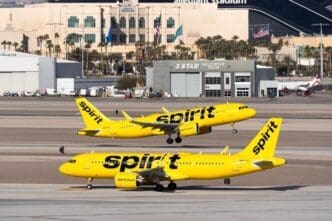In a notable development, a U.S. bankruptcy judge has approved Spirit Airlines’ significant debt restructuring plan, allowing the airline to transition $795 million of debt into equity and re-emerge as a private entity.
The decision was made by U.S. Bankruptcy Judge Sean Lane during a hearing in White Plains, New York. This judgment permits Spirit Airlines to implement a restructuring proposal that effectively cancels existing equity shares, transferring ownership to the airline’s lenders. These lenders include major investment entities such as Pacific Investment Management Company, UBS Asset Management, and Citadel Advisors.
Spirit Airlines has also announced plans to procure an additional $350 million through the sale of new equity shares, aiming to emerge from bankruptcy by the first quarter of 2025. The company is optimistic about its future operations, with CEO Ted Christie asserting that the restructuring will create a stronger, more financially flexible airline that can offer improved travel experiences and value to its passengers.
Prior to this development, Spirit Airlines had dismissed a proposed acquisition by Frontier Group. The offer from Frontier was deemed less beneficial for Spirit’s creditors compared to the bankruptcy restructuring plan. The proposed acquisition would have allowed Spirit to retain a 19% stake in the company but involved extra financial liabilities, including prolonged bankruptcy costs. Moreover, there was a risk that U.S. regulators might reject the merger, adding to the uncertainties.
Judge Lane is set to issue a formal written decision to dismiss objections from the U.S. Securities and Exchange Commission and the Office of the U.S. Trustee. These bodies had challenged Spirit’s bankruptcy plan, specifically criticizing the method by which legal claims of shareholders and creditors against non-debtors were released. The SEC and U.S. Trustee argued that Spirit’s assumption of creditor consent through an opt-out requirement was improper.
With this court approval, Spirit Airlines positions itself to overcome financial challenges and move forward as a privatized and potentially more robust contender in the airline industry.








